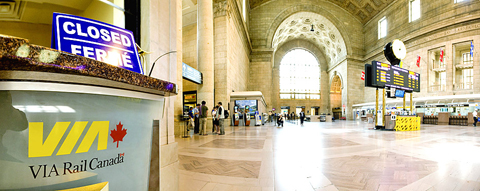Canadian national carrier Via Rail on Saturday temporarily laid off some 2,000 employees after a railway strike ground passenger train service to a halt, a spokeswoman said.
The employees received notice on Friday after 340 locomotive engineers and yardmasters went on strike, Via Rail spokeswoman Claude Arsenault said.
“If the conflict is not resolved, on Wednesday, we will close 16 stations that are still open” and all 2,400 Via Rail employees would then be temporarily without a job, she said.

PHOTO: BLOOMBERG
The workers, including those who maintain the trains or those who work in call centers, are represented by the Canadian Auto Workers union, and not Teamsters Canada, which represents railway workers.
Negotiations between Teamsters Canada, representing 340 locomotive engineers and the railway company have been ongoing for two and a half years, in hopes of reaching a collective agreement, and wage negotiations failed on Friday.
The two conflicting parties were seeking Saturday to “find a potential solution” with the help of a mediator named by the Canadian government, Arsenault said.
The strike has paralyzed almost all Canadian passenger trains, from the Atlantic to the Pacific. Some 12,000 people use Via Rail services each day.
Train service linking the financial capital Toronto in the east and the western city of Vancouver had already been suspended earlier in the week, in order to prevent passengers traveling along the 4,500km route from being left stranded indefinitely.
The strike does not affect freight trains.

MORE VISITORS: The Tourism Administration said that it is seeing positive prospects in its efforts to expand the tourism market in North America and Europe Taiwan has been ranked as the cheapest place in the world to travel to this year, based on a list recommended by NerdWallet. The San Francisco-based personal finance company said that Taiwan topped the list of 16 nations it chose for budget travelers because US tourists do not need visas and travelers can easily have a good meal for less than US$10. A bus ride in Taipei costs just under US$0.50, while subway rides start at US$0.60, the firm said, adding that public transportation in Taiwan is easy to navigate. The firm also called Taiwan a “food lover’s paradise,” citing inexpensive breakfast stalls

TRADE: A mandatory declaration of origin for manufactured goods bound for the US is to take effect on May 7 to block China from exploiting Taiwan’s trade channels All products manufactured in Taiwan and exported to the US must include a signed declaration of origin starting on May 7, the Bureau of Foreign Trade announced yesterday. US President Donald Trump on April 2 imposed a 32 percent tariff on imports from Taiwan, but one week later announced a 90-day pause on its implementation. However, a universal 10 percent tariff was immediately applied to most imports from around the world. On April 12, the Trump administration further exempted computers, smartphones and semiconductors from the new tariffs. In response, President William Lai’s (賴清德) administration has introduced a series of countermeasures to support affected

CROSS-STRAIT: The vast majority of Taiwanese support maintaining the ‘status quo,’ while concern is rising about Beijing’s influence operations More than eight out of 10 Taiwanese reject Beijing’s “one country, two systems” framework for cross-strait relations, according to a survey released by the Mainland Affairs Council (MAC) on Thursday. The MAC’s latest quarterly survey found that 84.4 percent of respondents opposed Beijing’s “one country, two systems” formula for handling cross-strait relations — a figure consistent with past polling. Over the past three years, opposition to the framework has remained high, ranging from a low of 83.6 percent in April 2023 to a peak of 89.6 percent in April last year. In the most recent poll, 82.5 percent also rejected China’s

PLUGGING HOLES: The amendments would bring the legislation in line with systems found in other countries such as Japan and the US, Legislator Chen Kuan-ting said Democratic Progressive Party (DPP) Legislator Chen Kuan-ting (陳冠廷) has proposed amending national security legislation amid a spate of espionage cases. Potential gaps in security vetting procedures for personnel with access to sensitive information prompted him to propose the amendments, which would introduce changes to Article 14 of the Classified National Security Information Protection Act (國家機密保護法), Chen said yesterday. The proposal, which aims to enhance interagency vetting procedures and reduce the risk of classified information leaks, would establish a comprehensive security clearance system in Taiwan, he said. The amendment would require character and loyalty checks for civil servants and intelligence personnel prior to